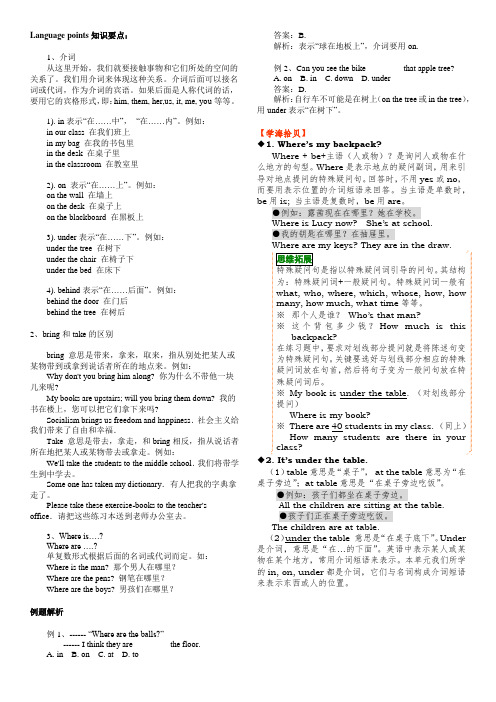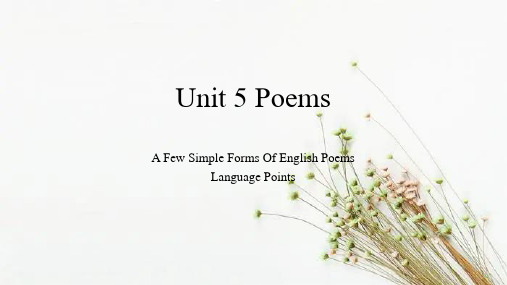Language points
unit 5 language points

4、只有努力学习而且从不放弃,你才能成功。
Only if you study hard and never give up can you succeed .
5、只有他能在一小时内完成这个工作。
Only he can finish the work in an hour .
The Rest of Elias’s Story 伊莱亚斯的故事续集
2.We were put into a position in which we had either to accept we were less important or fight the government.
Language points短语

with money.
他在金钱上对每个人都很大方。
②. 宽宏大量的,宽厚的[(+to/towards)] He is generous towards his subordinates. 他待部属很宽厚。 ③. 大量的; 丰富的; 丰盛的 She gave me a generous lunch. 她请我吃了一顿丰盛的午餐。
working people.
我们应该保持劳动人民的优良品质。
2. mean adj. 1. 吝啬的,小气的[(+about/over/with)] Her husband is very mean about money. 她的丈夫在金钱上很吝啬。 2. 卑鄙的, 心地不好的[(+to)] That was a mean trick! 那是一个卑劣的诡计!
15. 当权; 上台
come to power set up be sentenced to … in principle
16. 设立; 建立
17. 被判决…… 19. 原则上
18. 对(于) …很积极 be active in (doing) sth.
Unit5
1.把……送进监狱 put sb into prison as a matter of fact 2.事实上 3. 同……作斗争 fight with / against come to power 4. 上台、掌权 break the law 5.犯法 6. 无偿的 without pay lose heart 7. 失去信心 8.在……方面活跃、积极 be active in be willing to do sth 9.乐意或愿意做某事 10.失业 out of work
Language points

e.g. We were just about to leave when Jerry arrived. 我们正要离开,杰里来了。 Work was about to start on a new factory building. 一座新的厂房即将动工。
think they’ve earned the right to hold their heads high today. 他们可能输了这场比赛,但我仍然认为 他们赢得了今天昂首挺胸的权利。
When you walk through a storm, hold your head up high, and don't be afraid of the dark. 当你走过风暴,高昂地抬起头,并且不惧 黑暗。
to take the necessary action, especially in order to solve a problem = handle deal with somebody/something e.g. Don’t worry, I’ll deal with this.
别担心我会处理这件事的。
go all out 鼓足干劲,全力以赴
to try very hard to do or get something go all out for e.g. We’re going all out for victory in this
afternoon’s game. 在今天下午的比赛 中,我们将全力以赴争取胜利。
herself after she retired. 琼不知道退休后该如何打发时间。
Can you think of a challenge you faced?
Language points

unique.
strength n. the physical power and energy 【归纳】 that makes someone strong力量;体力
build up one’s strength 增加体力 have strength to do sth. 有力气做某事 with all one’s strength 用尽某人全身的力气 strength and weakness 强项和弱项 【拓展】 strong adj. 强大的,坚强的,坚固的 strengthen v. 加强,强化,巩固
【语境应用】汉译英 1) 他丢了工作,婚姻也破裂了。
He lost his job and his marriage fell apart. 2) 许多校舍不安全,有些简直是摇摇欲坠。
Many school buildings are unsafe, and some are falling apart.
John followed his brother’s example and also set up a small company.
2. As a player, Lang Ping brought honour and
glory tቤተ መጻሕፍቲ ባይዱ her country.
honour n. something that makes you feel very proud 荣誉;尊敬;荣幸
【拓展】 injury n. 受伤处,伤口;损害,伤害 suffer/ get / receive an injury 受伤 injured adj. 受伤的;有伤的 be badly/ seriously injured 严重受伤 eg The passengers were lucky to escape
Unit 4 Language points知识点课件课件高中英语人教版选择性必修第一册

para.3
8. employ v. 使用,雇佣 n. employment
unemployment employer employee
9. interpret v. 理解,翻译(口译) n. 口译人员 interpreter
interpret ... into ... 把… 翻译成 ... interpret… as … 把… 理解为…
para.4
by contrats
11. favour vt 赞成,喜欢 n. (approval)
adj. favourite favourable 赞同的,有利的
in favour of 支持,赞成 favour doing sth. 喜欢做某事 do sb a favour 帮助某人
Task 1
para.2
3. vary v. 变化,变化
n. variety
a variety of = varities of = various
adj. various
vary in ... 在 …方面不同
vary from ... to ... 从 ... 到 ... 不同
vary with ... 伴随 …而变化
should surf the Internet. 2. The chairman has also given his __a_p_p__ro__v_a_l__ (approve) for an investigation
into the case. 3.(用于申请信)如果我的申请能得到您的批准,我将不胜感激。
6. approve of n. approval
vi. 赞成,同意 vt. 批准,通过
Task 2
拓展: 动词+al 变为 名词 approve→approval arrive→arrival
language points

她在金钱方面很吝啬。
She is very mean with money.
对你的朋友不要太刻薄。
Don't be too mean to your friends.
mean v. 意思是,意味着 (meant)
mean to do sth.打算做某事 mean doing sth. 意味着... what does/ do sb. mean by...? 某人...是什么意思
Words preview
lawyer n. 律师 guidance n. 指导;领导 legal adj. 法律的; 依照法律的 fee n. 费(会费、学费等); 酬金 hopeful adj. (怀)有希望的
stage n. 舞台;阶段;时期
Words preview vote vt. & vi. 投票;选举 n. 投票;选票;表决 attack vt. 进攻;攻击;抨击 violence n. 暴力;暴行 equal adj. 相等的;平等的
put…in prison = take /send…to prison = throw … into prison 把…送进监狱
•
•
The car thieves have been put in
prison.
He was sent to prison ten years ago.
重点句型1
The time when I first met Nelson Mandela was a very difficult period of my life. period 期间,时期,学校的一节课,周期 Let’s finish this period and have a break. a period of rotation 自转周期
高考英语u10language-points

系 ⑴Her job has something to do with computers. 她的工作与计算机有些关系。
与…有一定的关系/无关系/很大的关
⑵Hard work has a lot to do with his success. 他的成功和他的努力有很大的关系。
③do away with sth. (abolish) 废除某 事物
⑶She doesn’t know what to do with herself. 她不知道怎么办才好。
⑤do without 不用或没有…也行
⑴She can’t do without a secretary. 她不能没有秘书。
⑵If we can’t afford a car, we’ll just have to do without one. 我们要是买不起汽车,也就只好 不用(汽车)了。
3. tear up
撕碎(文件) 等;
to destroy a document, ect. By tearing it into pieces She tore up all the letters he had sent her. John tore up his test paper so that his mother wouldn’t see his low grade. The wind tore up several trees. 拔起;挖开; 揭开; Mother tore up the carpeting in the living room and had a new rug put in.
3.fix
v.
*安排,确定 ⑴They have fixed the date for the wedding. 他们已确定了婚礼的日期。 ⑵The meeting was fixed for nine o’clock that evening. 会议定在当晚九点举行。
languagepoints

9. prevent sb. (from) doing sth. = stop sb. (from) doing sth. = keep sb. from doing sth. Nothing can prevent me from achieving my aims. Measures must be taken to prevent the river from being polluted. 为了阻止沙漠靠近北京,政府在组织植树。 To prevent the desert coming nearer, the government is planting trees.
此句型可转换为 It appears/seems that….. 1) It appeared that he was talking to himself. 2) It appears that the girl has known it. 3) He is only forty but it appears that he is quite old. 翻译:
7 Although Jane agreed with me on most points, there was one which she was unwilling to ____ A give out B give in C give away D give off 8 ____, I am coming tonight only to inform(告知) you of the meeting date A As a result B In general C In a nutshell D By the way
7.cut down砍倒;削减;缩短 Your article is too long, please cut it down to 1,000 words. You’d better cut down your expenses. Some other phrases: cut in 插嘴;打断 cut off 切掉;中断;断绝;隔绝 cut up 切碎;剁碎
高二英语language-points课件

London
你觉得他不会通过考试,是吗? You don’t suppose he will pass the exam, do you? change for the better/worse 变好/变坏 我们都希望天气很快会放晴。 We all hope the weather will change for the better.
London
At that time, many Londoners did not expect that their city would change for the better. 当时许多伦敦人认为他们城市的这种状况不会好转 了。
except引导的宾语从句有否定的意思,但从句不用 否定形式,而将expect变成否定形式,类似动词 还有 “ think, guess, suppose, believe, hope, etc.”
predict v. 预言;预告,预报 prediction n.
e.g. predict one’s future 预言某人的未来
她的预言证明是正确的。 Her prediction turned out to be correct.
New York
His prediction has partly come true. 他的预言已部分实现。 come + adj. 变成,达到(某种状态), (注意这里的come是系动词) e.g.你的理想总有一天会实现。 Your dream will come true some day.
be known as…以...知名 伦敦曾以雾都出名。 London was once known as a city of fog.
Language points

【语境应用】provide/offer/supply完成句子。 1) Anna’s school __o_ff_e_r_ed__ her a very good chance
last year. 2) Can you _p_r_o_v_i_d_e_ fifteen rooms for thirty people? 3) They were arrested for s_u_p_p__ly_i_n_g_d_r_u_g_s__to_ street
It’s a powerful argument against smoking.
2. It has directly resulted in the many satellites that now orbit Earth. As a result, space-based science has helped farming… result in to make something happen 导致,造成 as a result 所以;结果是
eg The workers argued for the right to increase the pay. The way he spends money argues that he is rich. A good argument can be made for comparing the IT revolution with the invention of writing itself.
His failure resulted from not working hard enough. He saved the life of the boss’ daughter. As a result, he was given an excellent job. He is unable to go to school as a result of the fall from his horse.
学案4:Language points

Language points1.KEEP IT UP, XIE LEI (P38)谢蕾,再接再厉★keep it up保持优秀成绩;继续干下去keep up坚持;维持;沿袭(风俗、传统等)keep up (with) 赶上;不落在后面keep in touch with 与······保持联系keep ... out of 不使······入内;不惹事keep away from (使)不接近①If he could keep it up, he would break the world record again.如果能再接再厉,他会再次打破世界纪录的。
②The modern world has been developing very fast. Every country must keep up with the time.现代世界一直在飞快地发展变化。
每个国家都需要与时俱进。
③They keep in touch with each other through the Internet.他们彼此通过因特网保持联系。
2.Chinese student fitting in well (P38)中国学生适应能力强★fit in相适应;相融和(1)fit in with适应,适合;与······合得来(2)be fit for 胜任;适合;合格be fit to do sth. 适合做某事keep fit 保持健康①He tried as much as he could to fit in but he could not because his mind was at home.他尽可能地去适应,但是做不到,因为他的心思在家里。
language points

Language Points
1. approachable a.易接近的;随和的 The top of the mountain is ~ only by going up some very steep steps. The boss/president is ~. approach v. n.接近、靠近;方法 approach sp. eg. the park, cinema... On his approach, the children ran off. My approach to learn English is to practise. =way/method/means
go in for 从事,参加 =take up
I don’t want to go in for engineering. Which event is he going in for at the Olympics?=take part in/participate in
11. feel at ease ease n. 轻松不费力;缓和;容易 His grandma has retired and is living a life of ease in the country. with ease=without difficulty The girl won the race with ease. at ease=comfortably He is sitting at ease in the sofa. Our boss is an approachable person---he tends to put all those around him at their ease.
12. light up 照亮;使……容光焕发 The burning house lit up the town. At the good news, everyone lit up. light a. 轻的 n. 光 v.点燃 (lighted, ~/ lit, ~) light a candle/a cigar/a torch … He lit a candle. He has lighted a candle. lighted a. 点燃着的 a brightly-lit room a lighted candle/cigar … in (the) light of 根据;按照 =according to
外研社必修一第二模块Language Points (共34张PPT)优秀课件

strict
(adj.) The father is strict with his son.
be strict with sb.(about sth.)
adv. strictly
n. strictness
strictly speaking严格说来
make sure
e.g. 1) Make sure that you take medicine according to the instructions.
She is such a lovely girl that everyone loves her. It was such fine weather that we wanted to go for a walk.
such… that… 如此……以至于……
such + a/an + adj.+ cn.(单数) + that…
(U)
to one’s amusement 令人感到好笑的是
amusement park
游乐园
to one’s amusement to one's surprise to one's belief
to one’s +n. 感到...
patient
(1) n.
(2) adj.
If we are patient with fishing, we can get lots of fish.
hate: dislike
~ doing 讨厌做某事〔习惯性的〕 ~ to do 不想/不愿做某事〔一次性的〕 ~ it when/if …
e.g. I hate it if I have to get up early. e.g. 我讨厌有人在寝室唱歌。
Language Points

Language PointsUnit one•In quest for—trying to find; seekingExample: The president went on to say that he was going to Europe in quest for a potential investor so as to establish a joint venture.•Integrity—quality of being honest and morally uprightExample: He’s a man of integrity; he won’t break his promise.•Make sense—have an understandable meaning1. If sth. makes sense, you can understand it. 有意义;言之有理These words don’t make any sense at all. 不知道写了些什么?2. When you make sense of sth, you succeed in understanding it.了解;领会;弄清意义You had to read it six times to make any sense of it…你得看上六遍才能琢磨出其中的含义。
3. If you say that sb makes sense or talks sense, you mean that they are saying wise or sensible things. 说得有理Do I make any sense?4. If a course of action makes sense, it seems reasonable and practical. 合理的;可行的;实际的Under these conditions it made sense to adopt labor-saving methods…在这种情况下,采取节省劳力的方法是切合实际的。
language points知识点

11. 大量的 plenty of a lot of / lots of a large quantity of a large number of a great/good many a large amount of a great deal of
名词复数 不可数名词
名词复数 不可数名词
12. get rid of 摆脱,除掉,处理掉
carry on 继续,进行 + with/doing sth Carry on working/with your work while I'm away. They decided to carry on their walk in spite of the weather.
23. operation 手术 (surgery外科手术)
You’d better get rid of your bad habits.
13. load n.负荷, 重担 vt.装载, 装填, 使担负 常与with连用 load…(容器、车)with…(sth)
①We loaded the truck with ②The truck was ca依赖,依靠,信赖 depend on/upon 依靠,信赖;
取决于,视情况而定
rely/depend on sb to do sth rely/depend on sb for sth
Language points知识要点

Language points知识要点:1、介词从这里开始,我们就要接触事物和它们所处的空间的关系了。
我们用介词来体现这种关系。
介词后面可以接名词或代词,作为介词的宾语。
如果后面是人称代词的话,要用它的宾格形式,即:him, them, her,us, it, me, you等等。
1). in表示“在……中”,“在……内”。
例如:in our class 在我们班上in my bag 在我的书包里in the desk 在桌子里in the classroom 在教室里2). on 表示“在……上”。
例如:on the wall 在墙上on the desk 在桌子上on the blackboard 在黑板上3). under表示“在……下”。
例如:under the tree 在树下under the chair 在椅子下under the bed 在床下4). behind表示“在……后面”。
例如:behind the door 在门后behind the tree 在树后2、bring和take的区别bring 意思是带来,拿来,取来,指从别处把某人或某物带到或拿到说话者所在的地点来。
例如:Why don't you bring him along? 你为什么不带他一块儿来呢?My books are upstairs; will you bring them down? 我的书在楼上,您可以把它们拿下来吗?Socialism brings us freedom and happiness.社会主义给我们带来了自由和幸福.Take 意思是带去,拿走,和bring相反,指从说话者所在地把某人或某物带去或拿走。
例如:We'll take the students to the middle school.我们将带学生到中学去。
Some one has taken my dictionary.有人把我的字典拿走了。
Language points

[知识链接] too, also, either, as well用法区别
too放在句子末尾,通常用逗号隔开。 I am a student, too. either在否定句中使用,但是放在句子末尾, 通常用逗号隔开。 Lucy doesn’t go to the party, either. also放在系动词be之后、实义动词之前。 I am also a student. Li Ming also takes part in a ceremony. as well 用在肯定句中,放在句子末尾。 Tony speaks Japanese as well.
Practice
1. Hard work ______ B success. A. result from B. results in C. results from D. resulting in 2. 粗心驾驶导致了这场事故。 Careless driving resulted in the accident.
[知识链接] result in & result from
result in “引起,导致,产生”,侧重于结 果,即 in 后面接导致的结果。如: The accident resulted in three people being killed. result from “起因于, 由……产生, 是……的 结果”,更侧重于强调起因,即from后面 接事情的起因。 Nothing has resulted from his efforts.
4. This will result in a smaller number of fish left.
result in 导致, 结果是
Stress and tiredness often result in a lack of concentration. Their dispute resulted in war. The slightest carelessness in feeding can result in their death.
Unit 5 Language points 知识点课件高中英语人教版2019选择性必修第三册

常用句型
• 1…but they are easy to learn and recite. 主语+be+adj.+to do ……是……的 Caution: a.主语是不定式to do的逻辑宾语,因此后面不能再加sth。
He is easy to persuade. b.To do中的动词如果是不及物动词的话,要加相应的介词,及物动 词的话则不需要。
The chair is comfortable to sit on. c.如果要指出不定式动作的发出者(不定式的逻辑主语)的话,在 to do 前加上for sb/sth。
This kind of job is easy for them to do.
2.With so many different forms of poetry to choose
4.The distinctive characteristics of poetry often include economical use …rhythm.
distinctive adj.独特的,与众不同的 distinctive feature 辨别属性;区别性特征 distinction区别;差别;特性;荣誉、勋章 distinctively特殊地;区别地
With nothing to do, she has to sleep.
Language points

Mid-Autumn Festival is regarded as a time for families to get together in China.
be used to doing…: be accustomed to… / be adapted to… 习惯于
eg We are used to accepting the love from parents and taking it for granted. (翻译) 我们习惯于接受父母的爱并且认为理所当然。
1. At first, I only regarded it as a hobby, but companies started paying me to take photos and publish them. regard … as…: to think of sb. or sth. in a particular way 把……视为……
过去常常做某事 I used to jog in the morning. (常暗指现在不做)
be used to do sth. 被用于做某事(被 Wood can be used to make
动语态)
paper.
【语境应用】根据语境选择短语的正确形式填空。
be used to do, be used to doing, used to do
eg I remember one of them in particular. I am interested in stories in general, and in detective stories in particular. (翻译) 我特别记住了他们之中的一位。 我总的来说对小说感兴趣,尤其是对侦探小说感兴趣。
- 1、下载文档前请自行甄别文档内容的完整性,平台不提供额外的编辑、内容补充、找答案等附加服务。
- 2、"仅部分预览"的文档,不可在线预览部分如存在完整性等问题,可反馈申请退款(可完整预览的文档不适用该条件!)。
- 3、如文档侵犯您的权益,请联系客服反馈,我们会尽快为您处理(人工客服工作时间:9:00-18:30)。
Unit1. Language point
Important words and phrases:
1. Jane has studied these families of chimps for many years and helped people understand how much they behave like humans.
behave (well/ badly) to /towards sb.
(1)vi. to act; bear oneself 行为, 举止, 表现
她表现出了很大的勇气。
She behaved with great courage.
他对顾客的态度不好。
He ____________ to (towards) the customers.
你应该学会举止得体。
You should ______________.
(2) vt. (oneself) in a socially accepted or polite way 举止适当或有礼
Please behave (yourselves), children. (翻译句子)
(3) vi. (of things) to act in a particular way (指事物) 有某种作用
My camera has been behaving well since it was repaired.
我的摄像机自从修好后一直很正常。
behaviour n. 行为;举止;态度
Their behaviour towards me shows that they don’t like me. (翻译句子)
She was ashamed of her child’s behavio ur. (翻译句子)
2. … the evening makes it all worthwhile.
worthwhile adj. 值得的,值得做的。
Nursing is a very worthwhile career. The experiment is worthwhile. (翻译句子)
be worthwhile doing / to do 值得做
It is worthwhile to do the job. /doing the job. (翻译句子)
3. observe
1) It was difficult to observe any change in Tom’s expression. (翻译句子)
2) John’s classmates observed him enter the net bar. (翻译句子)
3) I observed Mike walking along the street. (翻译句子)
observe意为“看到,注意到,观察到”,常用结构为:
observe sth., observe sb. do / doing sth.
4) All these traffic rules must be observed. (翻译句子) observe意为“遵守”
根据汉语提示,用observe的适当形式完成句子。
1. You should _______________________(遵守当地的风俗)when you go abroad.
2. All of us _________________________(看到他进了教室)with a book in his hand.
4. argue
1) They argue the plan for a long time.
2) Don’t argue with me, John. Just do what I tell you.
3) Mr. Smith is always ready to argue about politics with others.
argue意为“__________________” , 后跟名词,也可与with,about连用
翻译句子:
我们总是为了钱而争吵。
(翻译句子)
拓展
argument n.争论,争辩,争吵
settle an argument 解决争端
5. crowd in / into
1) Students managed to crowd into the bus.
2) The fans crowded in to see the pop star.
crowd in / into意为“涌入、挤进”
3) Memories of my childhood crowded into my mind / crowded in on me.
crowded in为“(想法、问题等)涌上心头,涌入脑海”.
crowd in (on sb.) = crowd into sth.
翻译下列句子:
1. 人们涌入那个新超市去购物。
2. 往事涌上她的心头。
(memory往事)
6. support
1)If you bring it up at the meeting, I’ll support you.
support既可作名词也可作动词。
作动词时,意为“_____”
2) It is not fair to let Mary support the family alone. support “养活”
3) The chair won’t support his weight. support “支撑”
4) The professor made some experiments in support of his views. (翻译句子)
support作名词时,意为“支持” ,
in support of意为“支持,证明”。
supporter 支持者
用support的适当形式填空:
1. The president had lots of __________.
2. Jack is in trouble. He needs our _______.
7. inspire sb. to do 鼓励某人做某事
His speech inspired us greatly. (inspire在句中的意思是:)
The teacher inspired us to make greater efforts. (inspire在句中的意思是:) The memory of his childhood inspired his first novel. (inspire在句中的意思是:) inspire 促成;赋予灵感
inspired 有灵感的
inspiring 激励人心的
Important sentences:
1. Watching a family of chimps wake up is our…..
观察黑猩猩一家如何醒来是我们......
动名词作主语, 主语是由不定式、动名词、从句构成的,谓语动词采用单数。
Working with you is pleasant.
Seeing is believing.
2. This means going back to a place where we left the family sleeping in a tree
the night before.
由定语从句修饰的place做go的宾语。
leave+宾语+doing 让某人做某事
e.g. They went off and left me sitting there all by mysel
f.
3. Only after her mother came to help her for the first few months was she
allowed to begin her project.
在她母亲头几个月来帮忙后,她才得以开始自己的计划。
将only及其后面的状语提前放在句首,句子要用部分倒装语序,即将be动词、助动词或情态动词放在主语之前。
only+状语“+部分倒装
只有这样,我们才能学好英语。
Only in this way can we learn English better.
到那时我才意识到我的错误。
Only then did I realize my mistakes.
但Only +主语时不倒装
Only you understand me. 只有你了解我。
仿写:只有用这种方法, 我们才能按时完成任务
注意:only在句首修饰句子的主语时,不用倒装语序。
Only Mary and Tom failed in the exam.
Useful expressions:
1. 醒来
2. 意味着
3. 在阴凉处
4. 离开,出发,启程
5. 或者…或者…
6. 警告某人做某事
7. 值得做8. 日常活动
9. 交流10.手势,肢体语言
11. 算出, 解决12.社会体系
13. 建立,设立14.过着…的生活涌入脑海, 15. 用上心头16.获得博士学位。
